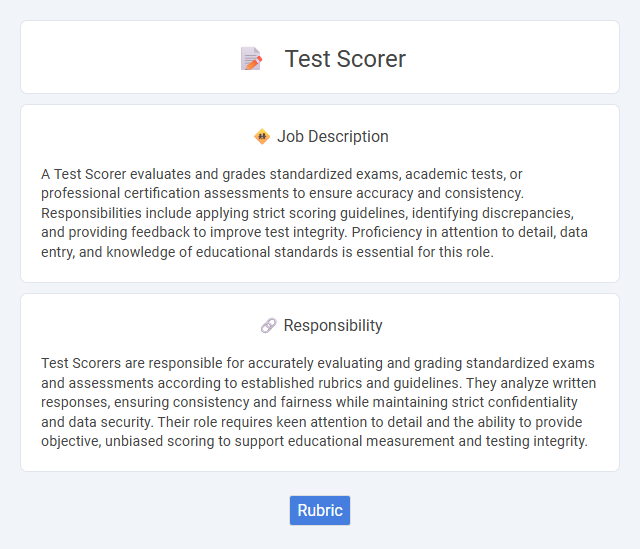
A Test Scorer evaluates and grades standardized exams, academic tests, or professional certification assessments to ensure accuracy and consistency. Responsibilities include applying strict scoring guidelines, identifying discrepancies, and providing feedback to improve test integrity. Proficiency in attention to detail, data entry, and knowledge of educational standards is essential for this role.
Individuals who prefer repetitive tasks and have strong attention to detail might find the Test Scorer role suitable, as it often requires consistent evaluation of standardized responses. People who thrive in low-stress environments and possess good time management skills could likely perform well in this position. Those who seek dynamic interaction or creative problem-solving may find the job less fulfilling or challenging.
Qualification
Test Scorers require strong attention to detail and proficiency in standardized assessment criteria to accurately evaluate student responses. Qualifications often include a high school diploma or equivalent, with many employers preferring candidates with experience in education or subject-matter expertise. Familiarity with data entry software and the ability to manage repetitive tasks efficiently are essential skills for success in this role.
Responsibility
Test Scorers are responsible for accurately evaluating and grading standardized exams and assessments according to established rubrics and guidelines. They analyze written responses, ensuring consistency and fairness while maintaining strict confidentiality and data security. Their role requires keen attention to detail and the ability to provide objective, unbiased scoring to support educational measurement and testing integrity.
Benefit
Test scorers likely benefit from flexible work schedules that accommodate diverse lifestyles. The role probably offers skill development in attention to detail and time management. Opportunities for remote work may increase job accessibility and work-life balance for many.
Challenge
A Test Scorer job likely presents a challenge in maintaining consistency and accuracy while evaluating large volumes of assessments under tight deadlines. The role may require strong attention to detail and the ability to make nuanced judgments about subjective responses. Navigating these demands could test one's focus and analytical skills on a regular basis.
Career Advancement
Test Scorer roles offer strategic career advancement opportunities through skill enhancement in data analysis and educational assessment. Proficiency in scoring methodologies and accuracy can lead to roles in quality assurance, test development, or educational consulting. Mastery in test interpretation and detailed reporting strengthens qualifications for leadership positions within academic and testing organizations.
Key Terms
Rubric
Test Scorers evaluate student responses by meticulously applying predefined rubrics that ensure consistent and objective assessment of each answer. Rubrics provide clear criteria and performance levels, enabling scorers to accurately measure knowledge, skills, and reasoning across various subjects. Mastery in interpreting rubric guidelines directly impacts the reliability and fairness of test scoring outcomes.
 kuljobs.com
kuljobs.com